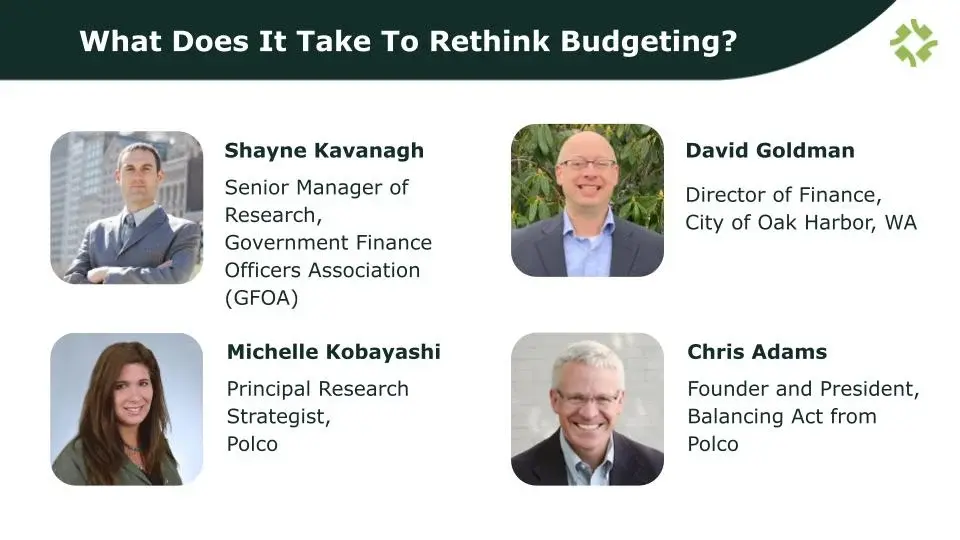Missed Opportunities To Build Trust in Local Government Budgeting
By Polco on February 15, 2024

Reproduced from the original blog post with permission from the Government Finance Research Center at the University of Illinois Chicago.
Survey results show what local government leaders currently think about the state of budgeting and if they're ready to innovate.
A new survey of local government finance professionals highlights the challenges and opportunities inherent in more effective and community-centric budgeting, especially the need for data-driven and transparent practices to build trust.
The survey results, released in November, showed that less than half of public sector finance professionals rated their current budget practices excellent or good for building trust with their communities. While most respondents gave excellent or good ratings to current budgeting practices, they gave lower ratings for building trust with stakeholders, incorporating resident priorities, and involving residents in decision-making.
Conducted by Polco in partnership with the Government Finance Officers Association (GFOA), and with the close collaboration of Envisio and Euna Solutions, the survey investigated how local government finance leaders feel about current budgeting practices and their readiness to embrace modernized approaches. The multi-wave online and mailed survey sampled GFOA members, resulting in 285 completions. A high proportion of respondents represented GFOA Distinguished Budget Award Winners, causing results to reflect more innovative practices.
Respondents included those directly responsible for the budget (72%), part of the budget team (15%), overseeing the budget department (12%), or a stakeholder in the budget function (1%). They provided valuable insights into their current budget methodologies. The evaluation, based on 15 quality characteristics, revealed sentiments within higher-performing organizations, primarily GFOA Distinguished Budget Award Winners.
Why Polco Launched The Budget Innovation Readiness Assessment
New technology and software are enabling local governments to modernize processes that in some cases have remained mostly unchanged for decades. But while technological advances are inspirational, if they aren’t accessible, they can fall flat. The three government technology companies heard this firsthand last year while talking with city managers and finance professionals about how to move the local government budget process forward.
While the budget officers shared their excitement for new software and tech tools, they noted that tech alone couldn’t modernize their budget processes. Some pointed out that they couldn’t use the new tools because their organizations lacked the capacity, knowledge, and skills to implement them.
In response, the companies created a white paper, “A Roadmap for Real Collaboration in Budgeting,” introducing an integrated and iterative process to modernize government budgeting while aligning with the Government Finance Officers Association’s Rethinking Budgeting initiative.
Following that effort, they decided to survey budget officers to understand what is currently happening with budgeting across the country, assess the biggest challenges and strengths of current budget methods, test important characteristics that contribute to budget updating preparedness identified by the GFOA Rethinking Budgeting team, and identify the readiness of organizations to embrace modern budgeting practices.
Key Takeaways: What Finance Leaders Think About Budgeting Today
Survey respondents were asked to rate their current budget methodology based on 15 budget quality characteristics, with ratings ranging from 100 (excellent) to 0 (poor).
The survey found that while local government budgets do a good job of incorporating the priorities of elected officials and staff, there is room for improvement when it comes to incorporating constituent opinions. About 9 in 10 respondents rated their budget processes as favorable at incorporating the values of elected officials, and 8 in 10 felt staff opinions also were given ample weight. Respondents also gave favorable assessments of the ability of their budget process to help resolve conflicts across departments and between stakeholder groups.
However, many organizations struggled to build trust with residents, incorporate their priorities and sentiments into budgets, facilitate understanding of the budget process, and involve residents in the making of important trade-off decisions.
Other Survey Highlights
Polco’s survey summary also noted that elected officials and staff members are generally satisfied with their current budget processes, and many are utilizing best practices in local government budgeting. About 8 in 10 respondents rated their current budget process as excellent or good, and about 9 in 10 external stakeholders (elected officials and staff) were satisfied with the current methods. High assessments were also given to providing good taxpayer value, usefulness in day-to-day decision-making, flexibility, and reliance on clear financial rules.
Organizations also reported using more innovative practices in budget construction. Slightly more than half indicated they devoted at least a moderate amount of time aligning revenues and expenditures to the organization's priority outcomes, developing and updating performance measurements, and developing and updating programs either within or across departments.
Respondents were asked to answer in their own words, “What is one thing about your budget or budget process that you would change?” The top responses fell into four categories. The most common responses related to a need for more automation and better technology. About 1 in 4 responses related to new or improved budgeting tools. Other important improvements related to aligning goals with strategic plans and focusing budgets on outcomes, increasing public engagement and transparency, and increasing and improving staff involvement.
More highlights included:
- New tools and technology are important for local government budgeting to evolve, with respondents noting they could find and use technology to make the budgeting process more efficient and actionable.
- Many key drivers of the overall budget process satisfaction related to organizational culture, with higher satisfaction aligning with more transparency and collaboration, data-driven processes, adaptability to change, and willingness to devote resources to staff training.
- New technology and budgeting tools on their own may not be enough to improve budgeting processes.
- The data argue that there are myriad levers to evolve a budget, and organizational culture is one important step.
Get the full survey report and more information on Rethinking Budgeting by visiting RBLearning.net.
The Tools You Need for Better Budgeting
With Polco, you can engage more residents, create budget transparency, create buy-in on your proposals, and align your budget where it will make the most impact.
Tools include:
- Budget Simulation - Let participants try their hand and balancing your city's pocketbook.
- Prioritize - Have stakeholders easily rank what budget priorities matter most.
- Taxpayer Receipt - Show residents exactly where their tax dollars go.
Related Articles
Popular posts
Sign-up for Updates
You May Also Like
These Related Stories

What Does It Take to Rethink Budgeting?

Transforming Public Finance: Embracing Rethinking Budgeting Principles


